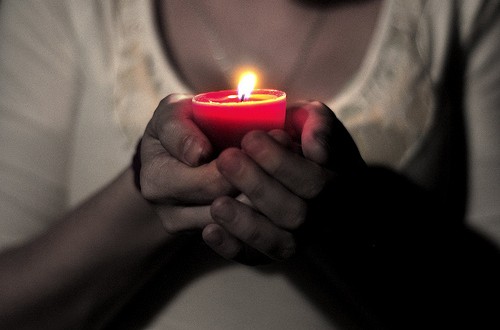by Michelle Sutton-Kerchner
Whether reeling from the aftermath of Hurricane Sandy or dealing with a personal catastrophe, here is how to help yourself and your loved ones …
Recent days on the East Coast reinforce we are not always in control. At times, we are powerless to that which we must experience. With trepidation of the unknown, a feeling of helplessness threatens to overwhelm the most resilient of us. The control-freaks of the world are not the only ones in a panic at times of crisis. The enormity of a crisis’ impact on our physical and mental well-being strikes every person.
Recognize the Magnitude
Everyday tensions and chronic stress are not synonymous with a crisis. To use a weather analogy, a rainy day is to stress as a hurricane is to a crisis. Using an umbrella during a superstorm is like managing a crisis with simple stress-reduction techniques. You may stay dry for a few seconds, and then your grip weakens and your resolve blows away.
Acknowledge the extent of a crisis situation. Denial results in being unprepared. The approach of a major storm, a surgery, or a loved one’s extended absence can be managed easier and in a healthful manner when we prepare. Everything from stocking the pantry to shaving your schedule helps. Have life’s routine chores accomplished so you can focus on additional responsibilities and issues relevant to the upcoming situation.

When things go smoothly, a crisis can sometimes be downgraded to a stressful inconvenience. Although you may be helpless to a scenario, you don’t have to be helpless in your reaction to it. You may not know the length and specifics of your recovery, be it from surgery, a natural disaster, or a personal trauma. However, certain factors can be assumed: a post-surgery diet of soup, post-storm battery back-up and flashlights, or a support group. You may need shelter in the simple form of a relaxing oasis or the more complex form of a temporary home.
When Immersed in the Crisis
Take care of yourself. With urgent matters fighting for your attention, it is essential to practice self-care. Emotions become exaggerated. Unfortunately, we often put ourselves last on the priority list during times of crisis. Do not wait until your body signals a warning. It could be too late. When sick or exhausted stressful situations are magnified.
Arrange a time and place for a comfortable rest or a hot shower. If tending to a sick loved one, perhaps another can relieve you of responsibilities for a sustaining break. Leave the bedside, if only to nap in a recliner or get fresh air. This is time to call in your support troops.
Process your feelings and reactions in order to overcome your situation. Be patient and accepting of those emotions. Reactions are as unique as our personality. They do not reflect weakness. Confide in a friend or use journaling (or, if acceptable for human consumption, blogging) as an outlet. Confront your response to this crisis to better form personally successful solutions.
Understand you are experiencing a life-altering interruption. Simply getting through the day may be an accomplishment. Put on hold commitments and responsibilities beyond the basics of living. Remember the responsibility to care for yourself though.
If you are a transplant to the area, without local family, get involved in your community. A resonating sense of solidarity provides mutual support and assurance in times of need, both others and your own. Reach out to pre-formed support groups, if you have not yet gotten involved. In times of crisis, we often need to go beyond a friend’s shoulder or helping hand. Religious establishments, organizations, and neighbors can be helpful sources. Go online and search. It is not necessary to struggle the journey alone. Sometimes, we must allow others to carry us, or at least feed us a home-cooked meal.
For some, meditating is an impossibility on a calm day. The decision to practice meditation during a crisis can be unrealistic, if you aren’t already an experienced practitioner. Let’s widen the parameter of what is considered meditation for crisis’ sake. If traditional meditation eludes you, give yourself a mental break. Call it downtime. Time for doing nothing.
Occupy your thoughts with a different topic than the crisis for at least five minutes. Walk away and think of a time in the future. Envision things improved. Focus on something pleasurable– like a small piece of chocolate. “Chocolate meditation” does exist and can be a delicious distraction. Enjoy it mindfully and be revived. (This is not an excuse to buy a bag of chocolate. Use whatever morsel of deliciousness you can find, and focus.)

Our brains are surprisingly active when we relax and rest, particularly in regions associated with decision-making, memories, and emotional processing. You actually use 30 percent more caloric energy than when using other parts of the brain. Experts infer these mental thought processes improve our ability to solve and respond to problems. That is the ideal state-of-mind for coping.
Remain faithful to fitness. In the throes of crisis, a workout may seem like a luxury. Yet, it is just as essential as other forms of self-care. Adequate sleep, healthy meals, and regular exercise are the foundation for functioning.
Exercise is linked with stronger levels of resilience. Some are born more resilient than others. This discrepancy is nothing a tweak to your physical fitness level cannot improve. Scientific research continuously proves exercise’s benefits to one’s physical health and mood. When we are healthy overall, we naturally respond better to life’s difficult interruptions and challenges.

During exercise, the body and mind are energized. You gain physical and mental strength and clarity, which makes you a powerhouse when confronting hardships. Thoughts become therapeutically redirected, either to the soothing repetition of motions or the fitness tasks at hand.
If you are unable to visit the Center, take a power walk or do some simple reps using your own resistance. Learn a few yoga poses for times like this. Some are specific to stress-reduction. Double them when in crisis mode.
Create peace internally. When a crisis threatens you to the very core, take restorative action. Restorative stretches are common in yoga. They open your body and mind, allowing you to breathe in new ideas and expel negativities. There is a calm within all, some of us just have to dig deeper. Often, you’ll discover the process of digging is what unearths peacefulness.
Think yoga is for wimps? Consider this applicable quote, perfect for facing crisis:
“The most valuable of yoga posture is to stand unshaken in calm inner serenity amidst the crash of breaking worlds.” (Paramahansa Yogananda, Autobiography of a Yogi)
Contact your personal trainer or Group Fitness instructor, if possible. S/he can share a take-away program to help maintain momentum in your routine during those inevitable Center absences. This is especially helpful when a crisis is going to cause a longer separation from your Center workouts. If an illness or injury is the cause, the Center’s fitness professionals can share rehabilitation and recovery techniques to keep you on track.
Nourish the Mindset
 Pre- or post-trauma, it is always possible to create an attitude of resilience. Bad days happen. Bad things happen, and to good people. Suffering is always optional. If you did not prepare yourself mentally for a crisis, or if it presented without warning, a well-nourished mind and body respond best.
Pre- or post-trauma, it is always possible to create an attitude of resilience. Bad days happen. Bad things happen, and to good people. Suffering is always optional. If you did not prepare yourself mentally for a crisis, or if it presented without warning, a well-nourished mind and body respond best.
Going into a crisis already deprived by stress? Let the situation be the turning point for a new approach to life. It is easy to turn this new leaf while sitting comfortably on a Friday afternoon with a fun-filled, sunny weekend ahead. What’s the challenge there! Test-drive the new attitude during a challenging situation. A week without modern conveniences from a natural disaster may prove ideal for learning how strong you really are.
Although cliché, there is always something worse. This– pain, situation, fear, worry, state of existence– too shall pass. Do not belittle personal damage to self or property, or large-scale tragedy. Rather, use a positive approach to recognize that which remains, and give subsequent thanks. Even in death, one eventually can discover life’s purest purpose when ready to travel beyond the sadness of it.
Our life experiences define who we are and how we live. As you reconstruct after any crisis, know you have grown. You truly can become stronger, and be a better resource for yourself and others.
Sources
“Cope with a Crisis or Trauma,” by Elizabeth Scott at www.about.com.
“Stress Management in Times of Crisis,” by Elizabeth Scott at www.about.com.
Images
Candle (introductory photo): http://www.flickr.com/photos/calamity_photography/4726912910/
Flashlights: http://www.flickr.com/photos/joelogon/4077210708/
Water bottles: http://www.flickr.com/photos/klearchos/3380660968/
Resting bare feet with sneakers: www.flickr.com/photos/perfectoinsecto/1429821251/
Seedling: http://www.flickr.com/photos/47108884@N07/4595334988/
 Fitness & Wellness News Your Source for Fitness News, Wellness News, Health News, and Nutrition News!
Fitness & Wellness News Your Source for Fitness News, Wellness News, Health News, and Nutrition News!





